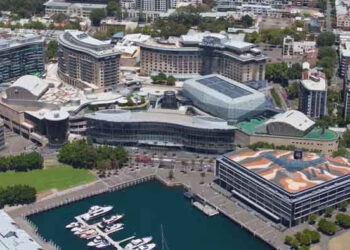The paint isn’t even dry on all parts of Marina Bay Sands in Singapore, but already Las Vegas Sand Corp is turning its attention to building a resort in Japan.
Actually all the parts of MBS aren’t even yet assembled in order for someone to paint them. The main opening is due on 23rd June. It hasn’t, however, put the company off announcing its ambitions for the Land of the Rising Sun.
“Our first target really now is Japan. The press has said that Japan is considering seriously building an integrated resort. We have visited both Tokyo and Osaka, and contacted people on the ground there,” Michael Leven, the President and Chief Operating Officer of LVS, told our sister publication Inside Asian Gaming following the launch of MBS.
There is, of course, the small matter of getting the Japanese parliament to pass a law allowing it. And we know how difficult that particular Diet can be.
“If there is hope Japan will do it, we believe it will be done on an integrated resort basis in Tokyo or Osaka or possibly Okinawa, which is not really our target, but the first two are,” added Mr Leven.
“I think the Japanese authorities are intelligent enough—looking at this [Marina Bay Sands] to see they need a boost of tourism. Japan’s economy is relatively flat so they are looking for opportunities to develop.
“Look at where Japan currently ranks in the MICE [meetings, incentives, conferences and exhibitions] business compared to Singapore. You’ll see my point. Japan is way down the list. It’s somewhere on a par with Stockholm as a convention destination for goodness sake. That’s ridiculous relative to Japan’s importance as a country and as an economy,” stated Mr Leven.
Talk is of course cheap regarding LVS’s or any other casino operator’s expansion into Japan. Despite media speculation, that country seems no nearer to legalising casino gaming now than it has been at any time in the preceding decade.
Political and administrative inertia—the two diseases that have caused the Japanese economy nearly to flatline for the best part of two decades after spectacular post-war growth—show no obvious signs of relinquishing their grip. That very inertia could, however, in the end provide the most compelling argument in favour of casino gaming. Tax from gaming and tourism could help to fill the government income gap caused by an ageing population, a shrinking workforce and diminishing tax base and unwillingness by the Japanese authorities to fill the demographic hole by allowing mass immigration by foreign workers.
For more on LVS’s Asian ambitions, read the latest edition of Inside Asian Gaming online at staging.staging.asgam.com.






























